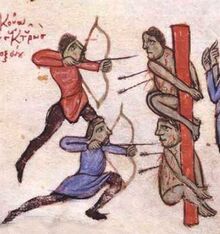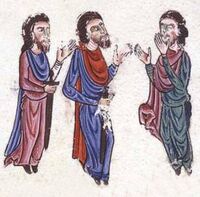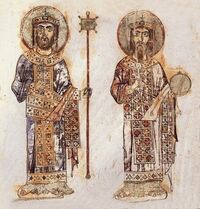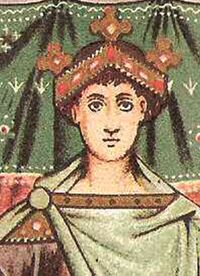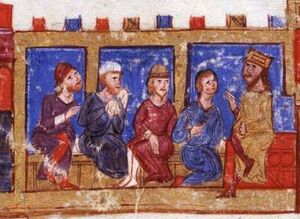Constantine VIII
“What a drag it is getting very old”
Constantine VIII was a notoriously ineffective Byzantine emperor. However, to his credit, he kept it up for a notoriously long time. In 963, at the age of two, he became co-emperor — alongside brother Basil II who, by contrast, had completed toilet training. Constantine kept hold of the office for the next 66 years. He rarely left Constantinople except for one ineffective miltary campaign, and instead spent most of his time puttering around the imperial palace in his purple slippers.
Constantine did have at least one purpose: to provide heirs to the empire. Since Basil II was gynophobic and possibly even homosexual, it was up to Constantine to maintain the dynasty. He failed, fathering three daughters and exactly zero sons.
Baby emperor[edit]
Constantine VIII was born in 960, two years after brother Basil. Whether Constantine remembers much about his father, emperor Romanos II, they were both easygoing — and easily dominated. On the other hand, Constantine was lucky to inherit little from his mother Theophano, a most accomplished murdereress, who may have bumped off five other Byzantine rulers.[1] In 962, Constantine became co-emperor with his brother and father, but this imperial power trio was abruptly terminated when the latter was as well.
For the next 13 years, Basil and Constantine had to stand aside as Theophano shared the throne with new husband Nikephoros II — and, when he was murdered, with John I. The crowded set-up only ended when John likewise met his doom. Power devolved to the two boys, now teenagers.
Brothers in office[edit]
The record of brothers sharing the Byzantine throne was not good. A few had died after suffering a mutilation (eyes, tongues, that sort of thing). Others had been banished to a rock to die of boredom. It's likely Basil knew his brother was the weaker spirit and was content to share the throne with him in harmony. Basil wanted to play soldiers all the time, never happier than when he was outside the capital smiting various foes. Constantine did apparently once try leading a military campaign, but Basil recalled him to Constantinople to make sure no other competitors would build up support against him. To a degree, that worked.
Basil must have told Constantine that Basil had no intention of getting married. If the dynasty were to endure, bedroom duties would fall to baby brother. Considering Constantine's title, he would have had no trouble snagging a foreign bride. The Russians had already been sent Constantine's sister Anna to seal a deal with them as allies and converts to the Eastern brand of Christianity. How about a bride from the rest of Western Christian Europe? Nothing happened; instead he married a woman called Helena, the daughter of a clever Byzantine bureaucrat. Three girls were the result: Eudokia, Zoe and Theodora.
Marry off the daughters[edit]
History contains no hint of drama within the marriage, though an heir to the imperial throne would have been nice. However, Helena died shortly after the birth of Theodora, and Constantine never pursued remarriage — whether owing to the disapproval of Basil or to bad memories of Helena's cooking. Instead, courtiers turned to the idea of arranging a prestigious marriage for Constantine's daughters. Holy Roman emperor Otto III in Germany seemed the perfect candidate.
The Holy Roman Empire was advancing rival claims to be the true heirs of the ancient Roman Empire. However, both its forks shared an interest in who was in charge of Southern Italy and the Muslim-held island of Sicily. Otto was a mixture that included Rough German, High Latin, and Courtly Greek; and his mother Theophano (not indeed Constantine's murderous mother of the same name) had been Greek too, and had ably run the Holy Roman Empire on her own after Otto's father Otto II died suddenly. Now Otto sought to marry someone to 'match his status'.
Some Holy Romans groused that Byzantine diplomats had pulled a fast one on the Germans earlier by passing off Otto III's mother as another sister of Basil and Constantine, when in fact she was emperor John's niece. So the Germans insisted in sending an embassy to Constantinople before signing any parchment or scroll.
Zoe's trip westwards[edit]
By 1001, when the embassy was dispatched, Otto was 21. The Holy Romans had a branch office in Rome they used merely to visit the Pope (or depose him if Otto judged the Holy Father was a criminal/heretic). Otto had built a throne room onto the office, intending to make Rome his practical capital.
Otto's lead diplomat was Archbishop Arnulf of Milan. At least he or others in the embassy could speak and write Greek. Emperor Basil took a break from bashing heads to take part in the meeting with his brother and nieces. Otto stated (on best quality parchment) that he wanted a 'pretty wife'. However, Arnulf was made aware that Constantine's eldest daughter Eudokia was 'disfigured'. No details are provided. Moreover, the youngest daughter, Theodora, 'looked like the back of a peasant's cart'. By Process of Elimination, Arnulf chose Zoe. She seemed to be vain and chattered a lot. Only time would tell whether she was Otto's type.
So for the first time since Charlemagne and empress Irene talked of 'getting together intimately', a United Roman Empire was a possibility. Archbishop Arnulf would accompany Zoe back to Italy. This would take months, as Zoe was going to knock the knitted tights off Otto with her silky wardrobe. It was January 1002 before everything was packed. Zoe had her wedding dress ready and was given a rundown of Otto's personality. He sounded gawky and overly serious, but Zoe thought her flouncy charms would see her through.
Scarcely had the wedding party got to Bari that the news came that young Otto was now a dead young Otto. He had been bitten by an insect or drank a dodgy glass of water. It didn't matter anymore. Otto was a goner. Zoe had been widowed before she had chance to marry.
Sole emperor[edit]
The next two decades are known as Constantine's 'Lost Years'. Basil spent more time away from the capital, waging genocide against the Bulgarians. Constantine's daughters Eudokia and Theodora checked into convents. Zoe remained free but moped a lot. Her father found no one else to marry her off to.
Constantine VIII never thought his own brother would die. But he did, curling up his purple slippers in 1025, leaving Constantine the sole emperor and with no Little Caesars with whom to share the office. It meant that the Macedonian dynasty founded two centuries earlier by Basil I was going to die out. A renewed marriage alliance with the Holy Roman Empire wasn't possible, as the successor to Otto III had his own wife, thank you.[2] Marital alliances with other, lesser-ranked monarchies don't seem to have been pursued.
In the ensuing three years of sole rule, what Constantine achieved was...nothing. Except continual hoodwinking, as the Byzantine aristocracy took back a lot of their influence that Basil II had successfully suppressed. It became a 'fill your boots' time.
Death[edit]
Constantine continued to dither about what to do with Zoe, a spinster of 50 years of age. The Byzantines believed in miracles, but it would take a gigantic one for Zoe to have children now. By chance, Holy Roman Emperor Conrad II sent an embassy to Constantinople to renew the offer advanced in 1001 for a marital alliance between the Germans and the Greeks. It seems a lot was lost in translation. Conrad's son and heir Henry (later emperor Henry III) was up for marriage. He was only 10; could Zoe wait for a little pubic hair to grow? Alas, the Germans were sent away empty-handed.
Constantine came up with the brainstorm that Zoe could marry General Constantine Dalassenos, a military commander in the style of Basil II. For once, it seemed Constantine had made the right choice. Zoe, for her part, went along with the plan, but the Byzantine civil service hated generals and their 'endless wars'. Dalassenos 'failed' the job interview. Zoe selected Romanos III Argyros, a man closer to the emperor's age. Constantine consented, but avoided having to say a toast to the absurd May-December liaison — by falling ill and dying.
References[edit]
- ↑ Namely: Constantine VII, Romanos II, Stephanos, Nikephoros II and John I.
- ↑ This was Holy Roman emperor Henry II. Though married, he died childless, as he thought carnal relations were forbidden by Jesus.
| Preceded by: Romanos II |
Byzantine Emperor 963–1028 |
Succeeded by: Zoe and Romanos III |
